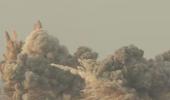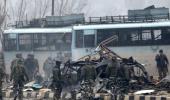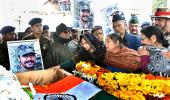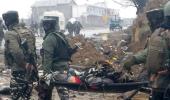'We know what we are signing up for. There is nothing greater than that.'
What Archana Masih/Rediff.com learnt from a chance encounter with an Indian Army officer.
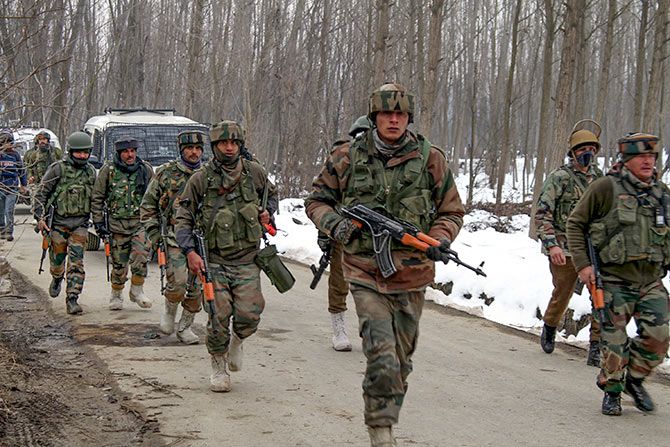
Whenever Major Delta*, a young Indian Army officer, posted in the Kashmir valley, travels home on leave for a few days, the first place where civilisational modernity hits him is at Delhi airport.
He has to change flights here to make the journey home -- and as he picks up a cup of coffee, he thinks how distant this is from the chai he drinks from a Borosil glass, half-covered with a camouflage cloth, at his post in Kashmir.
A bite into the brownie, reminds him of the pakoda and Parle G biscuits, the staple snacks in that area of conflict, where the temperature is freezing, the terrain is hard and a terrorist may lurk somewhere in the dark.
The other night at the post, there was roti, sabzi, dal and kheer for dinner. There was chicken-rice for lunch. Meals are usually shared with 1-2 other officers at the post.
These soldiers can never really be off-duty. Even when they are, there is every chance of receiving a phone call on the landline, informing them that they are "stand by".
Here, there are no Sunday holidays or restful nights. They can be called anytime in 24 hours. There is no sleeping or eating time.
The only time off is when soldiers get to go home on leave after 3 or 4 months of operating in a particularly hard tenure.
In the conflict-ridden valley, soldiers prefer to keep dinner light because night time is when terrorists strike and they have to be most alert.
"If you compare what we get to eat with any 5 star restaurant, I would say this food, at this altitude and temperature, tastes the best. It tastes amazing -- when you are in a hardship every morsel that goes into your body is well earned and a blessing," says the young officer I spoke to at a chance encounter.
It was a conversation that gave a sense of what soldiers face and endure while guarding the post on a hostile and bloody border.
In the month, the young officer has lost three brother officers fighting the war against terrorists in Kashmir.
Another officer he knew well from the Indian Air Force perished in an air crash in Bengaluru.
It was a brutal loss, but the young officer is made of sterner stuff.
"It is sad, but hear what Mrs Nikita Dhaundiyal's last words to her husband Major Vibhuti were -- 'Don't sympathise; he holds a position much higher than all of us'.
"If a wife can say that, I am sure a comrade can bear with it."
"Martyrdom is a part of our lives. We know what we are signing up for. It is a very noble thing. There is nothing greater than that," he says.
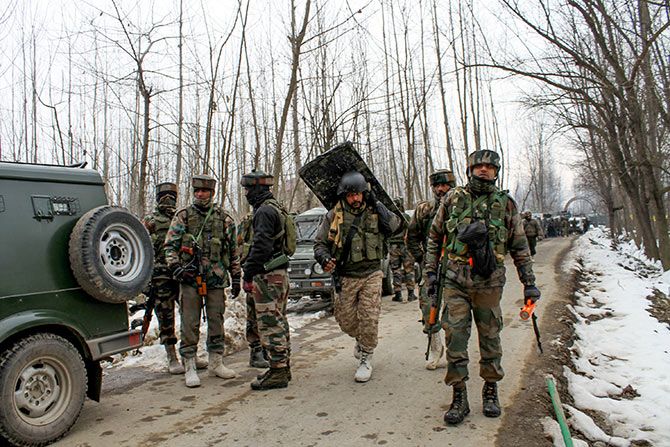
A tenure in Kashmir is amongst the hardest for security personnel. Every year on Republic Day, a majority of gallantry awards are given to men for operations in the valley, mostly young men.
"There is a void when you lose your fellow men in arms, but you know they are heroes and it was a privilege to serve with them."
"Whenever we part ways, we say 'It was an honour serving with you' -- because we never know when we will meet next or never," says the officer.
Security forces have suffered great losses against terrorists in Kashmir and I ask if he and his men are shaken when they lose men in the line of duty.
No, not the least bit, he says.
"It is just too bad that such things happen. We study it so that it doesn't happen again. The motto of the IAF's Surya Kiran team very aptly puts a soldier's spirit -- 'The show must go on'."
"As professional soldiers we are supposed to keep ourselves alive as long as there is life in us."
"It is the honour of a profession like this."
He is a young man, over two decades younger than me, and talks about the creed of a soldier with an authoritative surefootedness. His pride in being part of the Indian Army shines through his words.
He speaks politely, is well spoken and aware.
"The moment you make the cut and serve the army, whatever be the result, it is the man standing next to you who knows your true grit -- and that is the biggest medal anyone can ever get."
Away from family, friends and posted around the Line of Control, serving in Kashmir must get lonely. Connectivity has improved from what it was 10 or 15 years ago, but is far more sluggish than what the rest of India has on its fingertips.
The Internet, famous for being intermittent in the Kashmir valley, remains the main medium for connectivity. After Burhan Wani's elimination in 2016, the Internet and cellular phone connectivity were suspended for nearly seven-and-a-half months in Kashmir.
There are certain forward posts that are totally disconnected. They have satellite phones, but reliability is limited and it is expensive. Here, soldiers serve in rotation, and get to speak to their families when they come down to the base.
Sometimes, a month goes by without a phone call.
At a particularly difficult time for the security personnel that lost 91 men last year, the highest in a decade, and has suffered disproportionate losses this year -- the young officer is unwavering in his belief.
"We can either be ruthless in discharging our duties or do it with a humane touch, we do it with a humane touch, but the cost is that we may end up paying for with our lives."
It is interesting to hear the views of a young man with a perspective quite unlike what others his age might hold. At a moment when the country is riding high on patriotic fervour on the backs of its soldiers, these are men for whom life and death happen in real time.
"Unfortunately, the country is conditioned in such a way that all these emotions are for the civilians and keyboard warriors. People get patriotic on 26th January and 15th August -- when 365 days can be celebrated for a martyr," he says.
"A soldier's patriotism is not on August 15/January 26; it is every day."
"People think that by putting a post of Facebook or Instagram, we are doing our bit. But by breaking traffic rules, not paying taxes, throwing garbage out of the window, we are being more unpatriotic."
As we part ways, I wish him the very best always and tell him to be safe.
"Good day ma'am," he says, "Defending your country is a good cause; there is a nobility to it."
As I walk away, all I can feel is pride.
*The officer did not divulge his name for the feature.
